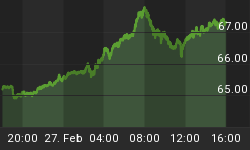In December, the Employment number was a dismal disappointment, weak on almost every count. And yet, a month later, we prepare for the next Employment number with the S&P some 50 points higher.
This might suggest that the underlying bond and stock market dynamic is not being driven by economic improvement, although it is perhaps more fair to say that the market dynamic is probably not being driven by improvement in the employment picture. And that's fine. Equity bulls can find plenty to like in the (at least temporary) ardor for deficit-cutting on Capitol Hill (we'll see how long that ardor burns), and both bond and stock investors can use as their causus belli for bearish and bullish trends (respectively) the money-printing by the Fed and other central banks. So it isn't necessary that Employment be booming right now for there to be made plausible - if unpersuasive to me personally - arguments in favor of the prevailing trend.
Then why is there so much chest-beating about how strong the jobs number really must be, and that the stock market is merely discounting a rapidly-strengthening economy? It annoys me, but doesn't particularly surprise me, when the markets move in advance of economic swings - although it is worth listening to the old wag who noted that the market has predicted nine of the last three expansions. But when economists seem to be looking at the market to justify their forecasts, I get worried.
Thursday's Initial Claims number was not revelatory. It bounced about as-expected, but the current level of 409k would have been cause for much rejoicing during any of the last couple of years. A decline in the number of people being laid off, however, has a fairly uncertain relationship to the number of people being hired, and the former usually improves (worsens) well before the latter.
There are plenty of reasons, if one is looking for them, to be skeptical that tomorrow's data is going to reflect the 250-300k number suggested by ADP, or even that it will exceed the 150k median estimate (some economists revised their guesses after ADP, but many did not so it seems a reasonable bet that the real median would be higher if we took the survey today). For example, Macroeconomic Advisors (who helped develop the ADP survey and continues to prepare data for it) mentioned that there was a seasonal quirk associated with the way the survey treats people who were carried on payrolls until the end of the year even if they had left the employer previously. The "Jobs Hard to Get" subindex of the Consumer Confidence survey continues to suggest that the man on the street isn't seeing widespread hiring. And the employment subindices of the ISM surveys released this week both softened. (Incidentally, the Unemployment Rate is expected to decline to 9.7% from 9.8%, but because any improvement in the labor market is likely to be coupled with a rise in the abysmally low labor force participation rate, I think that is not terribly likely unless Payrolls is quite strong. However, some economists are expecting a drop to 9.6%.)
This is not to say that the Employment number is likely to be weak. Last month's weaker-than-expected print may see some reversal this month. And after all, given the ADP report it will surprise nobody if the number is strong tomorrow.
And that's just the point. Strength will surprise nobody. Including me!
So S&Ps sit 16 points higher than they did last Friday (almost all of that via a gap higher on Monday), and the strength of the number due out tomorrow is as widely anticipated as was the revelry last Friday night in Times Square. If I was a punter, this would seem a good place for a punt on a short. (The real suspense for me will be if relieved buyers who "kept their powder dry" but now worry about missing the boat will rush to buy such a selloff, or if all of the arms have already been shipped to the front).
It is less clear that this is a good place to punt a long on bonds. Yes, it seems that the market has stabilized, and a retracement of 10y yields from 3.40% back to 3.10% or so wouldn't shock me in the slightest. But I can make a better case for stocks retracing the bull run than for bonds retracing very much of the bear. The latter market, I think, has begun a secular bear market and at 3.40%, the 10y note is already pretty exposed to lots of bad possibilities. Bonds are in the middle of the recent yield range, so from a day-trader's perspective there's not much clarity and a swing-trader buyer will be fighting a lot of larger-scale negatives.
The first trading week of the year is often fairly slow, and this one has been so. The percussion of the Payrolls release will be punctuated by testimony from Bernanke before the Senate Budget Panel at 9:30ET and four other Fed speakers throughout the day. But it will be dampened by the fact that meteorologists are calling for another half-foot of snow (with a chance of more) to hit the NY metro area in the late afternoon.
In other words...unlike the economic forecast, the meteorological forecast will likely impact actual trading tomorrow!















